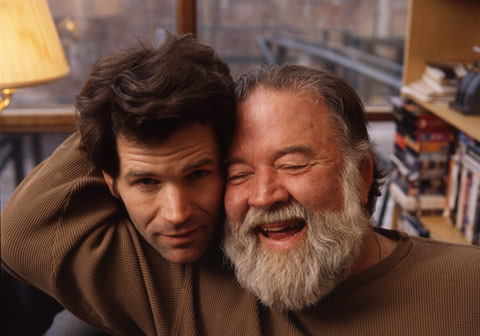
A SON’S STORY One wants to resist making comparisons between father and son, but they share in their writing the gift for earning sympathy for the toughest characters
|
His pick-up truck was warm.
Andre Dubus III collected me at the Newburyport train station last month when the snow piles were already high. We stopped first for a coffee for the road; he asked all the questions: siblings, hometown, are you married?
We'd be driving around the mill towns along the Merrimack River. Newburyport, Haverhill, Bradford. Two hours on the road in the truck to see the places where he grew up, alleys where he fought with people, the bars and gas stations and bridges that figure in his memoir, Townie, which Norton is publishing this week. (Dubus comes to the Brattle Theatre for a Harvard Book Store event on March 1.)
Newburyport center looks lovely in the snow. A great evergreen in the middle of the square is strung with lights. Small shops, cafés, boutiques, in brick mostly, and non-electric signage line the main drag. A pretty New England epitome.
It wasn't always.
In describing the Newburyport of his youth Dubus is using words like "blighted" and "abandoned." It's hard to picture. As we're rolling through town in his truck, all of it tidy, understated, inviting, it looks as though it hasn't changed since 1850.
"I've got to show you this photograph," Dubus says. It's hanging in the house of a friend of his. He makes a short cellphone call, asks if it'd be okay if we ducked in for a minute. "It's unlocked? Great, great."
"It's right around the corner," he says. "You've got to see it."
He's an enthusiastic talker, touching my elbow as he emphasizes a point.
We climb the steps to an imposing Victorian not far from the center of town and bang the snow off our boots. "Hello!," he shouts out as we enter. "Hello! It's Andre!"
A girl answers from upstairs, the 15-year-old daughter of his friend. "Hi," she yells back. "I'm dying my hair."
"Hi, sweetie, I'm just showing Nina here the Newburyport photograph."
We leave the front hall at the base of the stairs for a parlor and the photograph. It's hung on the wall by the door. An aerial shot taken in 1971 from not too high above the town center we'd just driven through. The town green, where we'd just seen the Christmas tree, is the primary landmark. Otherwise, "blighted" and "abandoned" are exactly right. A war zone — windows with broken glass, empty storefronts, no cars on the road, no people on the sidewalks. No cafés or gift shops. Derelict buildings, crumbling brick.
"That's what I was running from my whole life," Dubus says.
As we're leaving the house and the photograph, the girl comes to the top of the stairs wearing pants and a bikini top, her hair wet with dye. Dubus bounds up the stairs and gives her a fast hug. She's a good friend of his daughter's — or had been. They've been growing apart. She and Dubus are immediately warm and comfortable together, as though he's another member of the family.